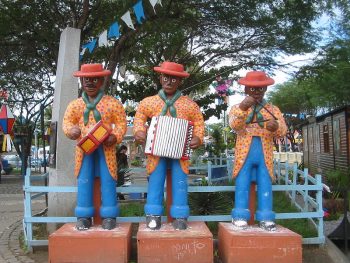Tag Archives: forro
More Brazilian musical instruments Posted by carol on Jul 9, 2021
Olá amigos leitores! Hello dear reader! We are back with a segunda parte (the second part) of our text about instrumentos musicais populares (popular musical instruments) in Brazil. If you missed the first part, we went over the cavaquinho, the berimbau, the agogô, the tambourine, the repique and the viola caipira. Click here to stay…
What is forró? Posted by carol on May 30, 2019

That Brazil is a país enorme (huge country) with continental dimensions, needless to say, but as vast as its size is the diversity and cultural richness of its povo (people). From North to South and East to West, each of the 27 estados (states) that make up Brazil have its own cultural identity and together…
Forró in the Dark Posted by Rachel on Jul 20, 2011
Even if you can’t travel to Brazil, there are plenty of opportunities to experience Brazilian culture abroad, thanks in part to Brazilian expats and gringos dedicated to celebrating Brazil’s heritage. Forró in the Dark is one such example. The musical group, made up of Brazilians living in New York, started a band in 2002 by…
A Vida do Viajante… Posted by polyana on Feb 19, 2010
Luiz Gonzaga or Gonzagão is one of the most prominent Brazilian folk singers of the 20th century. He popularized Northeastern baião music throughout the country, and much of his music was reproduced by artists such as Caetano Veloso, Gilberto Gil, Geraldo Vandré, amongst other great Brazilian artists. Baião is the foundation for forró, côco, and…
Brazilian Dance Series: Part I Posted by Rachel on Nov 19, 2008
Today we’re starting a new series about Brazilian dance forms. Forró is a type of dance that originated in the Northeast of Brazil, and is also known as arrasta-pé, bate-chinela, fobó, and forrobodó. Danced to the music of the same name, the movements have a variety of influences: indigenous ritual dances, traditional Dutch and Portuguese…


